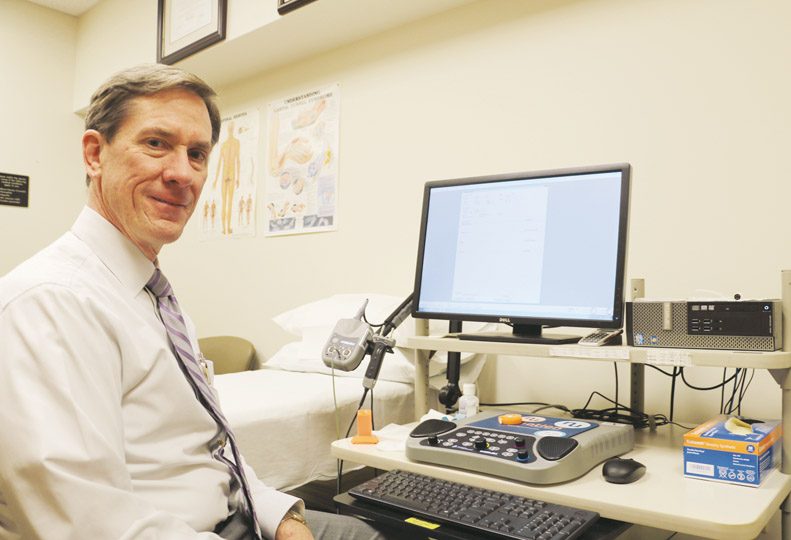
Home » ALS clinic in Spokane unites providers
ALS clinic in Spokane unites providers
Rockwood hopes multidisciplinary model will extend patients' lives

December 4, 2014
Rockwood Health System, of Spokane, launched a multidisciplinary clinic last June that’s focused on improving care for people suffering from amyotrophic lateral sclerosis, or ALS, and the clinic now has a new home that’s expected to help streamline patient services.
Formerly located within the Rockwood Neurology Center in the main Rockwood Clinic complex at 400 E. Fifth, the ALS clinic activities have been relocated—along with the rest of the neurology center—to the 10th floor of the Deaconess Health & Education Center building at 910 W. Fifth. The first clinic session there for patients will be held on Dec. 5, says Dr. Scott Carlson, clinic director.
The multidisciplinary approach, Carlson says, brings together all the therapists and experts in one place so a patient only has to come in once.
“In the old days, we’d see these patients, and then have to send them to the physical therapist, the respiratory therapist, and so on,” he says. “The beauty of this clinic is that patients see all their providers in one place.”
The Evergreen Chapter of the ALS Association, a national nonprofit dedicated to fighting the disease, also is a partner in the clinic, Carlson says.
ALS is a neurodegenerative disease that causes the motor neurons, which control muscle movement in the brain, nervous system, and spine to degenerate, he says. The most common symptom of ALS is fatigue and weakness as sufferers begin to lose control of their muscles and become paralyzed, he says.
“But, patients present in many different ways,” Carlson says. “ALS may be more of a syndrome.”
He says the life expectancy for someone with ALS varies, but the average is three years from the onset of symptoms and two years from the time of diagnosis.
According to the ALS Association, as many as 30,000 Americans currently have ALS. It usually strikes adults between the ages of 40 and 70.
At the clinic, patients rotate from exam room to exam room five times, Carlson says, a total of 2.5 hours of consultations. Carlson sees patients by himself in one exam room; in another room is a physical therapist and mobility specialist. A nutritionist and speech therapist work in tandem in another room. A respiratory therapist sees patients in a different room, and the final stop is with a representative of the ALS Association and a clinic nurse.
Research suggests that the multidisciplinary clinic approach can extend the lives of patients. A study conducted on ALS patients in Ireland from 1996 to 2000 found that patients who went to a multidisciplinary clinic lived an average of 7.5 months longer than those who went to a general neurology clinic.
“So, there is data that this actually improves survival,” Carlson says.
Clinic sessions are held every three months, he says. There are 10 patients in the session, he says, and they’re split over two days, with five patients being seen one day and the other five being seen the next day. The group is considering adding a third clinic day for an additional five patients, Carlson says.
“As we start to see a need, we’ll add a (third) clinic,” he says.
ALS drew widespread attention this past summer through viral online “ALS Ice Bucket Challenge” videos, which depicted people dumping ice water over their heads, or having someone else douse them, and challenging others to either do the same or to donate to ALS research.
“What we’ve put together is much more long-lasting,” Carlson says.
Carlson, who is a neurologist, specializes in neuromuscular disorders, he says, so his practice tends to see more ALS patients than a typical neurology practice.
“We have a lot of ALS patients in our practice-–probably 30,” he says. “Some are mild; they don’t need a multidisciplinary team. Others are too sick to leave home, and we treat them with in-home care.”
The Neurology Center provides a range of services to patients who suffer from neurological conditions such as epilepsy and other seizure disorders, multiple sclerosis, and nerve injuries. The ALS clinic doesn’t have its own dedicated space but rather exists as a program within the neurology center.
Rockwood launched the ALS clinic in June. Some of the providers who participate in the clinic—and who also serve other neurological patients—moved into the new Neurology Center space in mid-November, while other providers were already in the Health & Education Center.
Most people who are diagnosed with ALS end up on Social Security Income disability because they are unable to work, Carlson says. Patients are able to use private insurance or Medicaid to pay for their visits to the clinic.
The nearest multidisciplinary ALS clinic beyond Rockwood is located at Virginia Mason Hospital & Medical Center, in Seattle, Carlson says. He says he toured that clinic about four years ago and started working on opening one here.
“It was kind of difficult to bring all the talent under one roof, until the Rockwood Health System was developed,” he says.
Carlson says ALS patients travel to the clinic from places such as Wenatchee, Wash.; the Lewiston, Idaho area; and parts of Montana.
All the providers who participate in the clinic also work in other practices.
Carlson says he’s working on getting the clinic certified by the ALS Association. He also says that, in the future, the multidisciplinary clinic model could work for other conditions as well, such as Parkinson’s disease, multiple sclerosis, and stroke.
For now, Carlson says, the clinic will continue working to help the patients it has.
“We certainly don’t have a cure,” he says. “We have some treatments to prolong life and maintain quality of life, but until more is known about this disease, this is probably the best we can do.”
Latest News Special Report Health Care
Related Articles
Related Products



